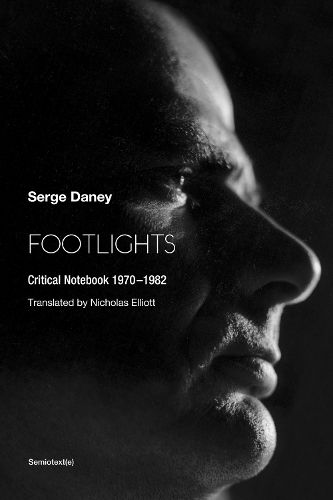Readings Newsletter
Become a Readings Member to make your shopping experience even easier.
Sign in or sign up for free!
You’re not far away from qualifying for FREE standard shipping within Australia
You’ve qualified for FREE standard shipping within Australia
The cart is loading…






The early essays of the most influential French film critic of the post-68 period.
The early essays of the most influential French film critic of the post-68 period.
The Footlights (1983) was the first book by Serge Daney, a film critic admired in his lifetime by Gilles Deleuze and Jean-Luc Godard and recognized since his premature death in 1992 as the most important French writer on film after Andre Bazin. The Footlights stands apart in Daney's body of work as the only collection of his essays he conceived of as a book, organizing his seminal pieces from Cahiers du Cinema by theme and linking them with original texts that reflect in a personal voice on the doubts, battles, and illuminations of a generation of film lovers inspired by the explorations of Lacanian theory and roused by the collective aspirations of Maoist dogma. In pieces on fellow travelers Godard and Straub/Huillet, on films ranging from Pasolini's Sal to Spielberg's Jaws, and on the difference between film language and television discourse, Daney offers a definitive portrait of an era of radical hope and disappointment.
$9.00 standard shipping within Australia
FREE standard shipping within Australia for orders over $100.00
Express & International shipping calculated at checkout
The early essays of the most influential French film critic of the post-68 period.
The early essays of the most influential French film critic of the post-68 period.
The Footlights (1983) was the first book by Serge Daney, a film critic admired in his lifetime by Gilles Deleuze and Jean-Luc Godard and recognized since his premature death in 1992 as the most important French writer on film after Andre Bazin. The Footlights stands apart in Daney's body of work as the only collection of his essays he conceived of as a book, organizing his seminal pieces from Cahiers du Cinema by theme and linking them with original texts that reflect in a personal voice on the doubts, battles, and illuminations of a generation of film lovers inspired by the explorations of Lacanian theory and roused by the collective aspirations of Maoist dogma. In pieces on fellow travelers Godard and Straub/Huillet, on films ranging from Pasolini's Sal to Spielberg's Jaws, and on the difference between film language and television discourse, Daney offers a definitive portrait of an era of radical hope and disappointment.